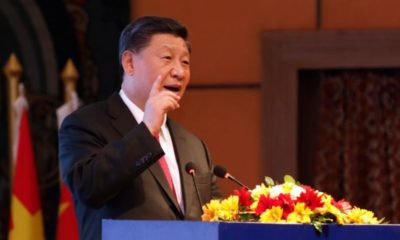World
Xi Jinping arrives in Philippines for APEC summit

Manila: Chinese President Xi Jinping arrived in Manila on Tuesday to attend the 23rd Asia-Pacific Economic Cooperation (APEC) summit to be held during November 18 and 19.
During the meeting, Xi will expound China’s policy on cooperation in the Asia-Pacific region and the implementation of the consensus reached at last year’s APEC meeting in Beijing, as per reported.
Xi is also expected to introduce the progress made in implementing the Belt and Road Initiative and the opportunities the proposal brings to the region and the world.
Xi’s presence at the APEC summit shows China’s support to the host country and that Beijing attaches great importance to APEC process, said Foreign Minister Wang Yi.
He said that APEC economies reached an important consensus on regional cooperation during 2014 summit held in Beijing.
China hopes this year’s summit will continue the momentum and further promote regional economic and trade cooperation.
Themed “Building Inclusive Economies, Building a Better World”, this year’s meeting will focus on specific subjects such as regional economic integration, small and medium-sized enterprises, human capital development and sustainable growth.
As the top-level and most representative cooperation mechanism that covers a wide range of areas in the Asia-Pacific, the 21-member APEC has played an important role in advancing trade liberalisation and facilitation, promoting economic integration and boosting connectivity.
The Asia-Pacific is vital to global peace and development. It accounts for 40 percent of world population, 48 percent of world trade and 57 percent of global output.
World
Lockdowns in China Force Urban Communities to Defy Censorship and Vent Frustration Online

Shanghai’s rich middle class is leading a wave of online dissent over the strict and prolonged lockdowns imposed in various parts of the country. Chinese internet censorship is struggling as patience is wearing thin in many urban centers, coming up with creative forms of online protests.
Social Media Posts Revealing Lockdown Tension in Shanghai
Drawn-out lockdowns are nothing new in China as authorities insist with the nation’s zero-Covid policy since the start of the pandemic. Currently over This time around, however, metropolitan areas like Shanghai are increasingly difficult to keep quiet, given that its more than 25 million residents have seen weeks of total isolation along with food shortages and many other service interruptions.
Dozens of towns and reportedly over 300 million Chinese citizens have been affected by lockdowns of different severity. As expected, urban netizens have been most outspoken over their difficulties by finding creative ways to get around state censorship and bans placed on topics, news comments and spontaneous campaigns.
Shanghai residents have been using mobile proxies and hijacking seemingly unrelated hashtags to talk about healthcare issues, delivery failures and the overall severity of their situation. The “positive energy” that the Chinese government wants to transmit during the recent prolonged series of lockdowns does not come naturally to those counting food supplies and online censors are working hard to filter words, trending topics and undesired social media sharing.
WeChat groups and message threads are under constant monitoring. Posts questioning the zero-Covid approach have been quickly deleted, including by leading Chinese health experts like Dr. Zhong Nanshan. Video footage is soon censored and protests and investigations are quickly made to disappear.
Where this has not worked, officials have exposed banners with warnings and outright threats like “watch your own mouth or face punishment”, while drones have been patrolling the city skies. Yet, if anything, this has led to further tensions and unspoken confrontation with Shanghai’s educated and affluent middle class.
Creative Online Solutions Harnessing Civic Energy
Announcements by Chinese social media that they would be publishing the IP addresses of users who “spread rumors” have not helped either. Tech industry research has shown that much of Asia’s tech-savvy population has a habit of using mobile proxies and other privacy tools, quickly finding workarounds to browse the internet freely and talk to the world about the hottest topics.
The sheer volume of forbidden posts is already a challenge for the very censorship system, experts explain. Unable to track all trending hashtags, state workers overlook topics that speak about the US, Ukraine or other popular news. Linking human rights elsewhere to their situation, Chinese online dissidents establish their informal channels and “hijack” the conversation to share personal or publicly relevant information about the Covid suppression in their town.
Sarcastic and satirical posts still dominate. Others hope to evade the censors by replacing words from famous poems or the national anthem. One thing is certain – social media, when harnessed with the right creativity, has proven its ability to mount pressure on the government in even some of the most strictly controlled tech environments like China.























